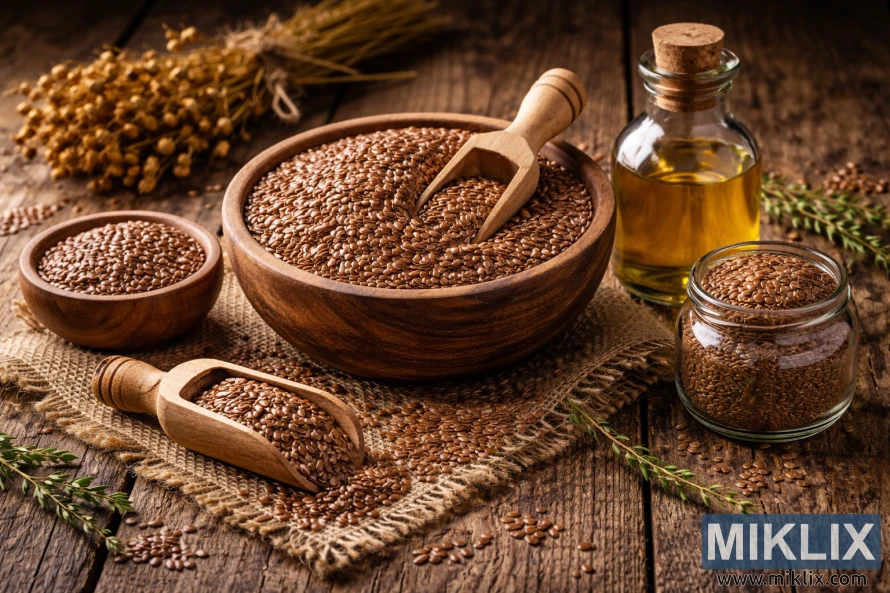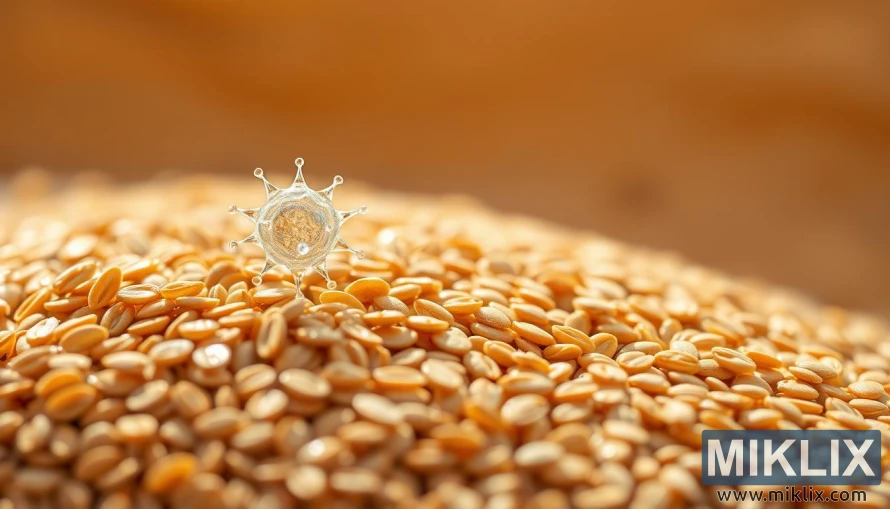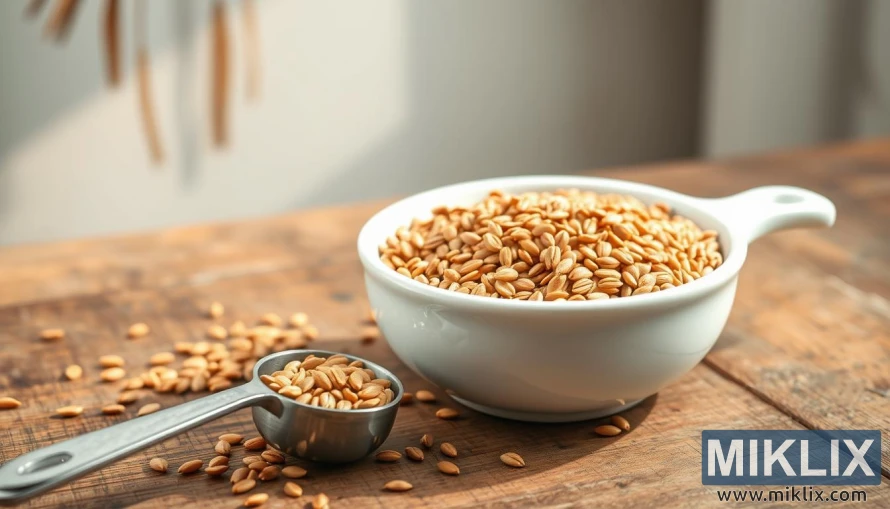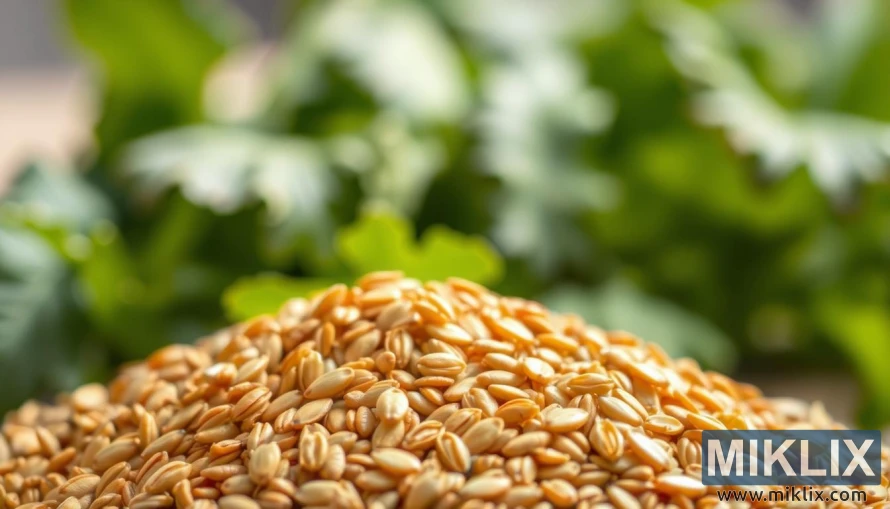The Flaxseed Fix: Unlocking Big Health Gains from a Small Superfood
Published: May 12, 2025 at 8:20:06 PM UTC
Last updated: December 26, 2025 at 11:04:42 AM UTC
Flaxseeds, also known as linseeds, come from the flax plant (Linum usitatissimum). They are small but packed with nutrients. These tiny seeds are great for your health, making them a smart choice for your meals. They are full of omega-3 fatty acids and dietary fiber. These nutrients help keep your heart healthy and can even prevent cancer. They also help with weight management and keeping blood sugar levels stable. Let's dive into how flaxseeds can boost your overall well-being.

Key Takeaways
- Flaxseeds are a nutrient-dense addition to your diet.
- High in omega-3 fatty acids, promoting heart health.
- Support cancer prevention through their unique compounds.
- Rich in dietary fiber, aiding digestive health.
- Help with weight management and stabilization of blood sugar levels.
Introduction to Flaxseeds
Flaxseeds come in two main types: golden and brown. Both are great for those who love plant-based foods. Golden flaxseeds taste a bit sweeter. You can find them whole, ground, or as oil, making them easy to use in cooking and baking.
Adding flaxseeds to your meals can make them tastier and healthier. You can sprinkle them on salads, mix them into smoothies, or add them to baked goods. They bring a nice texture and offer many health benefits. This introduction highlights how flaxseeds can make your meals better.
Loaded with Nutrients
Flaxseeds are a nutritional powerhouse. They offer a wide range of nutrients that boost overall health. Just one tablespoon, about 7 grams, has 37 calories, 2 grams of carbs, and 3 grams of fat. This small seed is packed with 2 grams of dietary fiber and 1 gram of protein.
Flaxseeds are also rich in vitamins and minerals. They contain thiamine, copper, manganese, and magnesium. A tablespoon gives you 10% of the daily thiamine value, which is key for energy. Copper helps with iron and boosts the immune system. Manganese is good for bones and metabolism, and magnesium supports over 300 body processes.
High in Omega-3 Fatty Acids
Flaxseeds are packed with nutrients, known for their omega-3 fatty acids, like alpha-linolenic acid (ALA). This plant-based omega-3 is key for heart health. Studies show that eating more ALA can cut down on inflammation and lower atherosclerosis risk.
A big study in 2021 found a link between more ALA and less heart disease. It showed that people eating more ALA had lower heart disease death rates. Adding flaxseeds to your diet can boost your heart health and provide a nutritious food choice.
May Protect Against Cancer
Flaxseeds are packed with lignans, a type of phytoestrogen. This has caught the eye of researchers for its cancer-fighting properties. Studies show lignans can stop cancer cells from growing. This makes flaxseeds a topic of growing interest in cancer prevention.
A 2018 review found that eating flaxseeds might lower breast cancer risk. This is true for postmenopausal women. But, there's more to learn about its effects on other cancers like colon and lung cancer.
While early results look good, we need more studies to confirm these findings. Adding flaxseeds to your diet could help prevent cancer. But, we must wait for more research to be sure.

Rich in Fiber
Flaxseeds are packed with dietary fiber, giving you about 2 grams in just one tablespoon. This amount is 5-8% of what you need daily. Adding flaxseeds to your diet is easy and beneficial.
The fiber in flaxseeds is split into soluble and insoluble types. Soluble fiber helps control blood sugar and cholesterol, which is good for your heart. Insoluble fiber keeps your bowels regular and helps prevent constipation.
Flaxseeds feed the good bacteria in your gut. This makes them not only nutritious but also helps your digestive system work better.
May Lower Cholesterol Levels
Studies suggest flaxseed can help lower cholesterol. Eating flaxseeds regularly can reduce LDL cholesterol, known as "bad" cholesterol. A review of 31 trials found flaxseeds improve LDL and total cholesterol, helping those with high cholesterol.
In a 2021 study, people who ate 30 grams of flaxseed daily saw their cholesterol drop. This is great for heart health. Keeping cholesterol levels in check is key to avoiding heart disease and staying healthy.
May Reduce Blood Pressure
Flaxseeds are getting attention for helping lower blood pressure. Studies show they can reduce both systolic and diastolic blood pressure. A 2021 study found that eating 30 grams of flaxseed daily for 12 weeks lowered blood pressure significantly.
Flaxseeds are packed with omega-3 fatty acids, fiber, and other good stuff. Adding them to your diet can help keep your heart healthy and fight high blood pressure.
May Stabilize Blood Sugar Levels
Flaxseeds might be key in keeping blood sugar stable, which is great for people with diabetes. Studies show that whole flaxseeds can lower blood sugar and fight insulin resistance. This is mainly because of the soluble fiber in flaxseeds, which slows down sugar absorption.

Eating flaxseeds can help those with type 2 diabetes keep their blood sugar steady. These small seeds could improve metabolic health. Regularly eating them might help the body handle sugar better, which is important for managing diabetes.
May Help You Manage Your Weight
Flaxseeds are key for weight management because of their special nutrients. Studies show that adding flaxseeds to your diet can help with weight loss. A 2022 study found that people who ate flaxseed hulls lost a lot of weight on a low-calorie diet.
The soluble fiber in flaxseeds helps you feel full longer. This makes it easier to avoid junk food and control how much you eat. With their high fiber and healthy fats, flaxseeds are great for losing weight. Here are some benefits of eating flaxseeds:
- Rich in fiber, promoting digestive health and satiety.
- Provides healthy fats, which support overall well-being.
- Enhances the nutritional profile of meals, helping maintain a balanced diet.
It's simple to add flaxseeds to your meals. You can sprinkle them on yogurt, mix them into smoothies, or use them in baked goods. These small seeds can make a big difference in managing your weight.
Tips for Adding Flaxseeds to Your Diet
Adding flaxseeds to your meals is easy and boosts your nutrition. Here are some tips to help you start:
- Add ground flaxseed to your breakfast cereals or smoothies for an extra nutrient boost.
- Mix flaxseeds into yogurt to create a healthy and filling snack.
- Incorporate it into baked goods like muffins or cookies to add both flavor and health benefits.
- Use ground flaxseed as an egg substitute in recipes, ideal for vegan baking.
Ground flaxseed is easier to digest than whole seeds. This makes it better for absorbing nutrients. Try out different flaxseed recipes to find what you like best.
Understanding Flaxseed Oil vs. Ground Flaxseeds
Flaxseed oil and ground flaxseeds have different nutritional values. This makes comparing ground flaxseeds important for those wanting to use flaxseeds. Flaxseed oil is full of alpha-linolenic acid (ALA), an omega-3 fatty acid that fights inflammation. But, it doesn't have the fiber or nutrients found in ground flaxseeds.
Ground flaxseeds, by contrast, are known for their fiber. This fiber is key for good digestion and feeling full. They have both soluble and insoluble fiber, which helps with digestion and might lower cholesterol. So, while flaxseed oil is great for omega-3s, ground flaxseeds give you more nutrients.
If you want to boost your health, eating ground flaxseeds is a good choice. They help with omega-3 intake and add fiber and vitamins for better health.
How Much Flaxseed Should You Consume?
Experts say you should eat 1 to 2 tablespoons (7 to 14 grams) of ground flaxseed each day. This amount is good for your health and doesn't cause too much fiber. Adding flaxseeds to your diet can make you feel better overall.
Even though there's no official advice from U.S. health groups, many think flaxseeds are great for a healthy diet. Here are some easy ways to add flaxseeds to your food:
- Stir ground flaxseed into smoothies for an added nutritional boost.
- Sprinkle it on top of yogurt or oatmeal.
- Add flaxseed to baked goods like muffins and pancakes.
- Mix it into salad dressings for a nutty flavor.

Are There Any Risks to Eating Flaxseeds?
Flaxseeds are known for their health benefits. But, there are some flaxseed risks to consider. One issue is digestive problems. This is because flaxseeds are very high in fiber.
Starting with small amounts can help avoid discomfort. This way, you can get used to them without problems.
Another risk is allergy. While rare, some people might react to flaxseeds. Symptoms can range from itching and rash to more serious reactions.
If you're allergic to sesame seeds or nuts, be careful with flaxseeds. It's better to avoid them if you're unsure.
Flaxseeds can also affect certain medications, like blood thinners. If you're taking these, talk to your doctor first. They can help you understand the risks.
People with hormone-sensitive conditions should also be cautious. Flaxseeds contain phytoestrogens, which might affect hormones.
Versatility of Flaxseeds in Cooking
Flaxseeds are great for anyone wanting to make their meals better. They can be used in many ways. Sprinkle them on salads for crunch, blend into smoothies for nutrition, or mix into baked goods.
Their nutty taste is perfect for both sweet and savory dishes. This makes them a great choice for many recipes.
Flaxseeds can also thicken soups and sauces. Adding them to your recipes can make your meals taste better and be healthier. Try using ground flaxseeds in pancake batter or oatmeal for more fiber.
Flaxseeds and Heart Health
Flaxseeds are great for your heart because they're full of omega-3 fatty acids and fiber. Adding them to your meals can really help your heart health. They're a great addition to any healthy diet.
Studies show that eating flaxseeds regularly can lower your cholesterol. This is key for a healthy heart. It helps improve heart conditions and reduces the risk of heart disease.
Flaxseeds also help with blood flow because of their omega-3 fatty acids. This makes your heart work better. It's important for keeping your heart healthy over time.
In short, flaxseeds are not just good for your meals. They're also very good for your heart. They can make your heart health better, making them a smart choice for heart health.
Flaxseeds and Digestive Health
Flaxseeds are great for your diet if you want better digestion. They are full of fiber, which helps your bowels move regularly. This fiber also makes it easier to pass stools by absorbing water in your intestines.
The soluble fiber in flaxseeds is a prebiotic. It helps the good bacteria in your gut. This is key for a balanced digestive system. A healthy gut means better digestion, making flaxseeds a good choice for your health.

Conclusion
Flaxseeds offer many health benefits, making them a great choice for a healthy diet. They are full of nutrients that help your heart, protect against cancer, and aid in weight control. Adding flaxseeds to your meals can improve your health.
Flaxseeds are also easy to use in smoothies, baked goods, and salads. This makes it simple and fun to include them in your diet. Their rich nutrients help keep you healthy and prevent diseases.
By making flaxseeds a regular part of your diet, you can enjoy lasting health benefits. They are truly a superfood that should be in your balanced diet.
Further Reading
If you enjoyed this post, you may also like these suggestions:
- Peach Perfect: The Sweet Path to Better Health
- Broccoli Gains: The Cruciferous Key to Better Health
- The Amino Acid Advantage: L-Arginine’s Role in Circulation, Immunity, and Endurance
